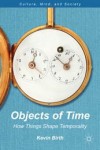Anthropologist Kevin Birth explores what it means to have a global perspective on the church calendar. Estamos en el sur y como estamos en tiempos de recuperar nuestra identidad, el Gobierno boliviano está recuperando nuestro Sarawi, de acuerdo a nuestro Sarawi, que significa camino, de acuerdo con nuestro Ñan, en quechua, nuestros relojes deberÃan girar a la izquierda. Translation: We are in the south and since we are in times of recovering our identity, the Bolivian Government is recovering our Sarawi, and … [Read more...] about Lent: Frames of Reference and a Global Perspective (Scholar’s Compass)
clock
How would you describe your “time consciousness?”
While reading Kevin Birth‘s Objects of Time: How Things Shape Temporality, I wondered if weekends provide an opportunity to tell time differently. There is a danger in viewing the clock as necessary for certain cognitive tasks simply because we use it for those tasks. The importance of clock time in twenty-first-century economic practices cannot be used as grounds for assuming that it was necessary for economic practices in the medieval period. This misconception is key to the view of medieval timekeeping as … [Read more...] about How would you describe your “time consciousness?”
“What, then, is time?”
As some of you know, I've been enjoying ESN blogger/mentor Kevin Birth's provocative Objects of Time: How Things Shape Temporality (Palgrave Macmillan, New York, NY: 2012). Augustine of Hippo wrote, "What, then, is time? If no one asks me, I know; if I want to explain it to someone who asks me, I do not know" (1997 [ca. 397-98], 256). The question stumps us for quite different reasons. We surround ourselves with cognitive artifacts to tell us what time is, and the time these artifacts represent is demonstrably … [Read more...] about “What, then, is time?”

